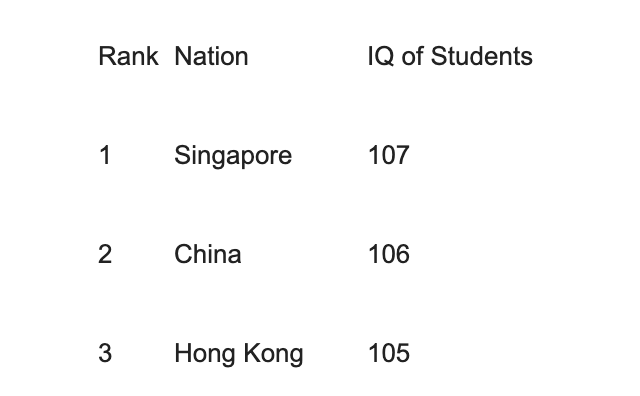
The Global Student Intelligence Gap: Singapore Leads, UK Must Catch Up
A recent study has revealed a striking disparity in student intelligence across nations.
Singapore has emerged as the country with the most intelligent students, boasting an impressive average IQ of 107. In stark contrast, the United Kingdom ranks a disappointing fourteenth, tied with several other nations at an average IQ of 100.
Adela Belin from Writers Per Hour explains why this study should serve as a catalyst for nations to reevaluate their educational systems and cultural attitudes towards learning.

Singapore's Secret to Success
Singapore's remarkable achievement can be attributed to a multitude of factors, including a robust educational system, innovative teaching methodologies, and a deeply ingrained cultural emphasis on academic excellence.
‘The nation's educational policies prioritise rigorous curricula, fostering critical thinking and problem-solving skills from an early age,’ Adela says. ‘Additionally, Singapore's teaching methods are highly interactive and student-centred, encouraging active participation and engagement.’
‘The cultural attitudes towards education in Singapore also play a pivotal role. Parents and society as a whole place immense value on academic achievement, creating an environment that nurtures intellectual curiosity and a thirst for knowledge,’ Adela adds.
Implications and Recommendations for the UK
The UK's relatively low ranking should serve as a wake-up call for policymakers and educators alike.
Failing to cultivate the intellectual potential of its youth could have far-reaching consequences, hindering the nation's ability to compete in an increasingly knowledge-driven global economy.
To address this challenge, ‘the UK could draw inspiration from Singapore's successful model. Implementing educational reforms that prioritise critical thinking, problem-solving, and student engagement could be instrumental in elevating student performance,’ Adela says.
‘Additionally, fostering a cultural shift that celebrates academic excellence and encourages lifelong learning could have a profound impact on the intellectual development of future generations,’ she explains.
‘Other nations grappling with similar challenges should also take note. Investing in education and nurturing a culture of intellectual curiosity is not merely an investment in the future of individual students but also a strategic investment in the long-term prosperity and competitiveness of a nation,’ Adela adds.
As the world continues to evolve at a rapid pace, the importance of cultivating a highly educated and intellectually capable workforce cannot be overstated.
Adela concludes: ‘By learning from the successes of nations like Singapore and implementing innovative educational strategies, countries can unlock the full potential of their students, paving the way for a brighter and more prosperous future.’
Trending
-
1 UK Tech Sector Secures a Third of European VC Funding in 2024
Azamat Abdoullaev -
2 France’s Main Problem is Socialism, Not Elections
Daniel Lacalle -
3 Fed Chair Jerome Powell Reports 'Modest' Progress in Inflation Fight
Daniel Lacalle -
4 AI Investments Drive 47% Increase in US Venture Capital Funding
Felix Yim -
5 The Future of Work: How Significance Drives Employee Engagement
Daniel Burrus





Comments